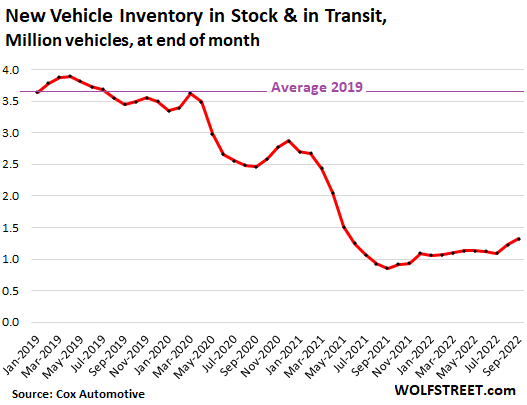by Wolf Richter, Wolf Street:
 By brand & segment: Big incentives or interest-rate buydowns for pickups. But many Kia, Toyota, and Honda models essentially out of stock.
By brand & segment: Big incentives or interest-rate buydowns for pickups. But many Kia, Toyota, and Honda models essentially out of stock.
Inventories of new vehicles at the end of September rose to 1.23 million vehicles, still down by 62% – or by 2.13 million vehicles! – from September 2019, where there were 3.45 million vehicles in inventory, according to data from Cox Automotive.
TRUTH LIVES on at https://sgtreport.tv/
But it’s not across the board: Some brands offering vehicles with high fuel economy are essentially out of stock (particularly Kia, Toyota, and Honda); other brands are amply stocked or overstocked, particularly those focused on full-size trucks and SUVs (Ram and Jeep). At Ford, Chevy, Chrysler, and Dodge dealers, supply is normalizing. There are now big discounts off MSRP or interest-rate buydowns being offered on pickup trucks. Gone are most of the obnoxious addendum stickers on top of MSRP.

Supply at the end of September ticked up to 42 days – enough inventory in stock and in transit to support 42 days of sales. This is still very low, but up from the 30-day range last summer. In the year 2019, supply averaged 89 days, and incentives were big, and there were lots of deals to be had back then. Now, overall supply is still far from those 2019 levels, but inventories of some truck models are climbing back into that range.
Overall sales are still terrible – back in the range where they’d first been in the 1970s – handicapped by the shortages across many models, and now perhaps also by sky-high prices. Total new-vehicle sales in September dipped to 1.16 million vehicles, according to data from the Bureau of Economic Analysis. The seasonally adjusted annual rate of sales in September was down by 21.6% from September 2019.
By brand, from shortages to oversupply.
As a result of the spectacular price spike of gasoline this year, demand for fuel efficient vehicles surged, which caught automakers by total surprise. Supply chains are long and complex, and production plans are decided way in advance, and production cannot be changed on the spot to accommodate such a sudden change in consumer preferences.
In addition, in a move that will go down in automotive history as the best-ever act of Wall Street genius, US brands killed off their smaller fuel-efficient car models in recent years because they couldn’t make enough money on them. Wall Street imposed short-termism had won the day. US automakers, one after the other, fell into the trap. Now they have nothing to sell to those customers. Import brands, whose vehicles are mostly assembled in the US and Mexico, are raking it in.
So now the most fuel-efficient vehicles have essentially sold out at dealers. Brands with somewhere near “20 days’ supply” (such as Kia) means that you will find nearly nothing on many dealer lots, and most of the vehicles they’re showing in “inventory” on their websites are actually in transit, and many of them have already been sold before they arrive on the lot.
The five brands with the tightest supply – between 19 days and 27 days – are all “import” brands. But they assemble many of their models at plants in the US and Mexico with components that are manufactured in the US, Mexico, Canada, China, Thailand, Japan, Korea, etc.
Kia has the least supply: 19.1 days in September, roughly unchanged from August. This means it will be tough to walk into your local dealer and pick out a new vehicle that sits on the lot, and drive home with it.
Tesla doesn’t have dealers, and so doesn’t have inventory on dealer lots, because back in the day when EVs were still ridiculed, Tesla managed to make deals with numerous states to be exempt from their state franchise laws and sell directly to consumers. Any inventory it has is its own inventory. It doesn’t disclose US sales, and doesn’t disclose its own vehicle inventories. And so Tesla is not on the list.
Fiat and Alfa Romeo (Stellantis brands) are also not on the list because sales in the US are minuscule, and days’ supply is so huge – 120 days for Alphas and 130 days for Fiats – that it would distort the chart. And overall in the US, they just don’t matter.
Volvo is overstocked with 87.5 days’ supply. It is owned by Chinese automaker Geely, and some of its models are made in China. This is the most overstocked brand on this list (data via Cox Automotive):




